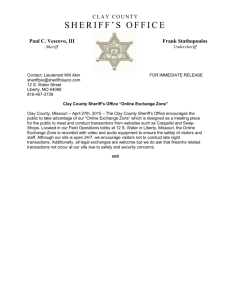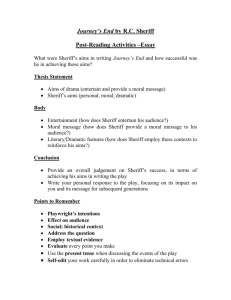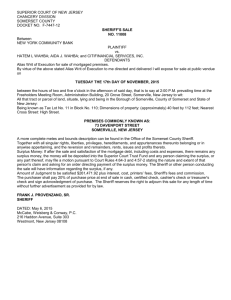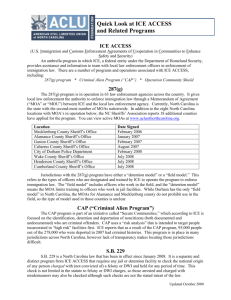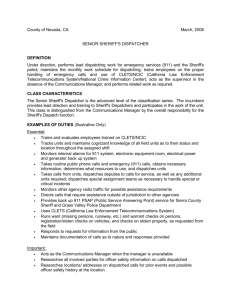Officer Survival-Ethics 071207 142KB Jan 19 2015 10:34:51 AM
advertisement
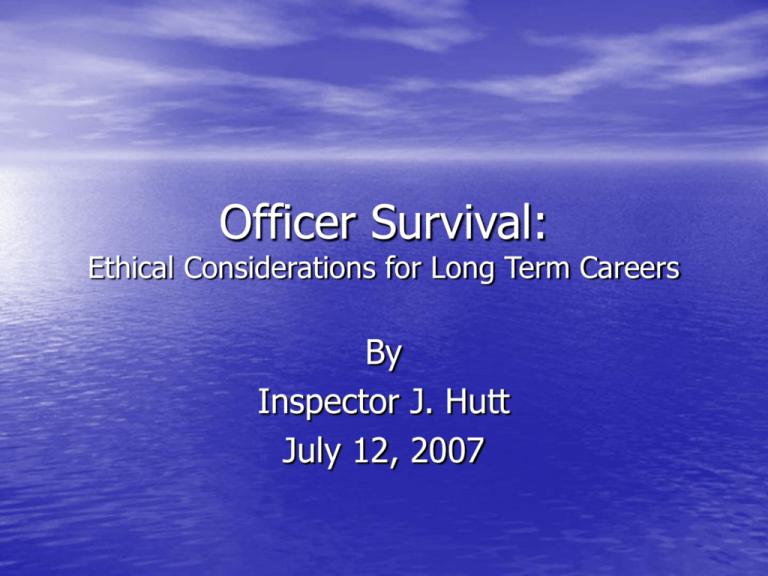
Officer Survival: Ethical Considerations for Long Term Careers By Inspector J. Hutt July 12, 2007 Class Survey • How many of you are planning on retiring from this agency? • How many of you are planning to promote and retire at a higher pay grade? • How many of you have (or will have) family members who depend on your employment for health care benefits or financial support? Why is this important? • Statistically speaking, we have employees that will not survive a full career due to poor judgment. (currently about 1%/year) • In the last 3 1/2 years we have lost 24 employees (Termination or Resignation) for VBDS violations. • In the last 10 years, we have lost one current & 3 former employees to suicide. My Goal? • To help you avoid making a career ending mistake. • Everybody retires under honorable conditions. Fundamentals of Ethical Expectations • ACSO Law Enforcement Code of Ethics • ACSO Rules of Conduct • ACSO Disciplinary Process • ACSO Awards Process ACSO Law Enforcement Code of Ethics • As a member of the law enforcement profession, my fundamental duty is to serve mankind; to safeguard lives and property; to protect the innocent against deception, the weak against oppression or intimidation and the peaceful against violence or disorder; and to respect the constitutional rights of all people to liberty, equality and justice. Code of Ethics (cont) • I will keep my private life unsullied as an example to all; maintain courageous calm in the face of danger, scorn or ridicule; develop self-restraint; and be constantly mindful of the welfare of others. Honest in thought and deed in both my personal and official life. I will be exemplary in obeying the laws of the land and the regulations of my department. Whatever I see or hear of a confidential nature, or that is confided to me in my official capacity, will be kept ever secret unless revelation is necessary in the performance of my duty. Code of Ethics (cont) • I will never act officiously or permit personal feelings, prejudices, animosities or friendship to influence my decisions. With no compromise for crime and with relentless prosecution of criminals, I will enforce the law courteously and appropriately without fear or favor, malice or ill will, never employing unnecessary force or violence and never accepting gratuities. Code of Ethics (cont) • I recognize the badge of my office as a symbol of public faith, and I accept it as a public trust to be held so long as I am true to the ethics of law enforcement. I will constantly strive to achieve these objectives and ideals, dedicating myself before God to my chosen profession..............law enforcement. ACSO Rules of Conduct • VALUE BASED DIRECTIVE SYSTEM: Any Sheriff's Office policy, procedure, memorandum, email, job description, performance anchor, post order, instructional material or instructions, law enforcement code of ethics, or supervisor’s directive, either oral or written that serves to direct or guide a member's actions. Rules of Conduct (cont) • 1. Compliance with Sheriff's Office Value Based • • Directive System Members of the Sheriff's Office shall maintain familiarity with, perform their duties according to, and conduct themselves within the framework of the Sheriff's Office Value Based Directive System. Each member of the agency shall maintain familiarity with, and obey all rules, regulations, lawful orders and directives. A member shall not commit or omit any acts that violate any rule, regulation, order or directive; nor shall aid or abet another to do so. Rules of Conduct (cont) • 2. Lawful Conduct • Members shall conduct themselves in a lawful manner. Members shall obey the laws of the United States of America and of any state or local jurisdiction. A criminal conviction for violation of a law is prima facia evidence of a violation of this rule. Rules of Conduct (cont) • 3. Truthfulness • Members shall be truthful in all matters associated with the Sheriff's Office. Rules of Conduct (cont) • 4. Respect for Others • Members shall treat others courteously, with fairness and respect. Rules of Conduct (cont) • 5. Public Trust and Authority • Members are entrusted to non-abusively safeguard • the authority and public trust vested in them and other members. Members shall always use their position, resources, and credentials appropriately. Members shall not make promises or arrangements with a suspect, or between a suspect and a victim, intended to permit the suspect to escape prosecution, without the knowledge and authority of supervisory personnel and the Office of District Attorney. Each member shall faithfully and properly perform all duties. Rules of Conduct (cont) • 6. Gifts and Gratuities 4-ALDF-7C-02, • Members shall not use their Sheriff's Office status to seek or accept for themselves or others, any favors, gifts, benefits, rewards or gratuities which may compromise the member's position and/or would not ordinarily be afforded the public. A gratuity is defined as a free or reduced price service, or item given to or accepted by an identified member of the agency with the anticipation of influencing or gaining additional presence or service from the member or other members of the agency. No members or contractors will use their official position to secure privileges for themselves. <4-ALDF7C-02> Rules of Conduct (cont) • 7. Adherence to Orders - Members shall obey lawful orders given by supervisors, acting supervisors and trainers to those in training. In some cases, orders may be issued by a member with seniority. <12.1.3> <P.2.1.3> Rules of Conduct (cont) • 8. Conduct – • On and Off Duty Members shall use reasonable judgment and refrain from conduct that reflects unfavorably upon the Sheriff's Office. Regulations in this section shall apply to the conduct of members both on and off duty. This type of conduct includes:<P.3.2.10> Rules of Conduct (cont) • A. Brings the Sheriff's Office into disrepute • B. Reflects discredit upon the individual as a member of the Sheriff's Office • C. Tends to impair the operation, effectiveness or efficiency of the Sheriff's Office or its members. Rules of Conduct (cont) • 9. Cooperation in Investigations • Members shall assist and cooperate with any Sheriff's Office authorized investigation. Rules of Conduct (cont) • 10.Security of Information • Members shall treat the official business of the Sheriff's Office as confidential. Members do not: Rules of Conduct (cont) • a. Access, review or remove any report or • • record for other than Sheriff's Office purposes; b. Communicate any information that may jeopardize an investigation, arrest, law enforcement action or prosecution, or which may aid a person to escape, destroy or remove evidence c. Communicate any information that may endanger the safety or well being of others or jeopardize the operation of the Sheriff's Office. Overview of Disciplinary Process • Review Disciplinary Process Presentation Overview of Awards Process • Review presentation of Awards Process Career Survival Tips • If you find yourself in an ethical dilemma: DO THE RIGHT THING-THE RIGHT WAY! • DON’T- Tarnish your long term record for a short term issue. • Talk to a trustworthy confidant before you make a decision if you are able. • Get Help from somebody who’s been there. Tips (cont) • If you become the subject of an IA: a. TELL THE TRUTH!!! b. Accept responsibility c. Learn from your mistake d. Don’t repeat your mistake e. Move on gracefully-others have. Tips (cont) • Remember, most IA’s are not career enders- LYING IS! • Most IA’s are survivable-don’t make it worse by lying or refusal to accept responsibility. Warning Signs • Burnout • Apathy • Bitterness • Us vs. Them attitude • Everybody else is an Adam Henry Get Help before the fall • If you or a co-worker exhibit are experiencing any of these-GET HELPbefore it gets worse. • Dr. Gilmartin’s book • Peer Support • EAP- Pamphlets in hallways • Health Care Provider My Goal? • To help you avoid making a career ending mistake. • Everybody retires under honorable conditions. • Call me or a trusted friend before something bad happens. Get help on the front end before it’s too late. ??? • Questions or Comments?
